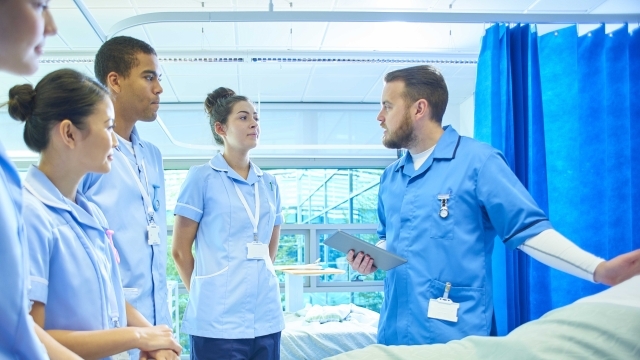

UG
Nursing, Bachelor of Science
The nursing program in St. John’s University’s College of Pharmacy and Health Sciences provides a stellar education within the context of our Catholic and Vincentian tradition, which is rich in its perspectives of human dignity, freedom, justice, truth, and respect for the natural world. This is a licensure qualifying program open to applicants with good moral character and demonstrated academic ability.
- Home
- Academics
- Majors and Programs of Study
- Nursing, Bachelor of Science
St. John’s University’s Bachelor of Science in Nursing is a four-year program that provides education and instruction to achieve your goal of becoming a registered professional nurse.
The B.S. in Nursing program offers the following:
- individualized student attention from distinguished faculty and practicing nurses
- a curriculum that hones the high-level critical thinking skills necessary for the attainment of RN licensure
- preparation for culturally competent practice and leadership in service to the community
- specialized advisement and faculty mentors for guidance and support
- clinical experiences in acute, ambulatory, critical care, and community-based settings
- a new Health Sciences Center that includes modern classrooms, skills labs and common areas for students.
- a state-of-the-art Simulation Center with high-fidelity simulation manikins that provide learning opportunities for students to apply classroom instruction to real-life patient care.
- direct admission from high school
- Degree Type
- BS
- Area of Interest
- Nursing, Pharmacy & Health Sciences
- Associated Colleges or Schools
- Program Location
- Queens Campus
- Required Credit Hours
- 128
Admission Requirements
Click here for more information about admission to this and other acclaimed undergraduate programs at St. John’s University.
In addition to the University requirements, the following are needed for nursing program consideration.
- official high school transcript(s) with one biology course and one chemistry course
- high school diploma with a minimum GPA > 90%
- SAT optional
No transfer students are considered at this time.
Accreditation Information
The baccalaureate degree in nursing program at St. John's University is pursuing initial accreditation by the Commission on Collegiate Nursing Education (www.ccneaccreditation.org). Applying for accreditation does not guarantee that accreditation will be granted.
For more information, please contact the Office of Undergraduate Admissions.
Office of Undergraduate Admission
8000 Utopia Parkway
Queens, NY 11439
718-990-2000
[email protected]
Department Contact
Sherri Juszcak-Alarcon
Administrative Coordinator
St. Vincent Health Sciences Center, Room 226
Experiential Learning
Student-to-faculty ratio
In clinical settings
Growth
According to the US Bureau of Labor Statistics, employment of registered nurses is projected to grow nine percent from 2020 to 2030.

Nursing Clinical Rotations
You will be matched within a network of partner hospitals and healthcare agencies for clinical rotations in your junior and senior years. During your rotation, you will experience specialty nursing care in various healthcare settings supported by the direct supervision of a nursing faculty member in a large teaching hospital or a small community agency.
Our partners include:
- Aids Center of Queens County
- Blythedale Children's Hospital
- Catholic Health Services of Long Island
- DaVita Kidney Care
- Flushing Hospital Medical Center
- Gurwin Health Care System
- Hospital for Special Surgery
- Little Neck Care Center
- Jamaica Hospital Medical Center
- Memorial Sloan Kettering Cancer Center
- Mount Sinai Health System
- New York City Health + Hospitals
- NewYork-Presbyterian Queens
- St. Mary's Home Care
- VNS Health
Featured Faculty
The nursing faculty comprises experienced nurse educators who are dedicated, nationally recognized, and specialized in their field.
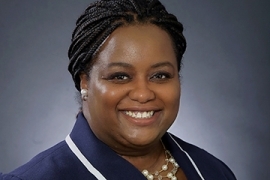
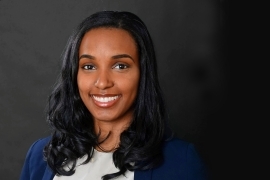
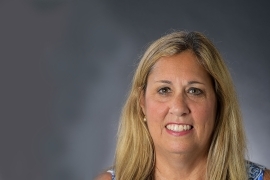



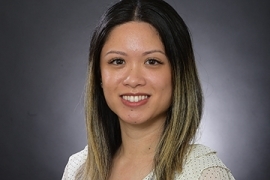
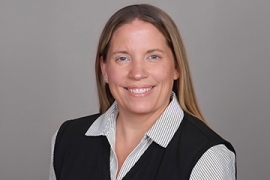
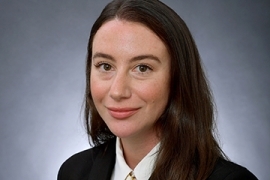
Meet Our Nursing Students
Administration and Staff
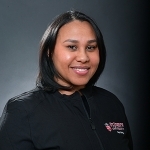
Janina Galdamez, MPA
Clinical Coordinator
St. Vincent Health Sciences Center, Room 226
[email protected]
718-990-6673

Sherri Juszcak-Alarcon
Nursing Program Administrator
St. Vincent Health Sciences Center, Room 226
[email protected]
718-990-2386
Vision
Through quality teaching, scholarship, and practice, we seek to develop within our students a passion for lifelong learning and service to all, especially those in underserved communities.
Nursing is both an art and a science. It is a learned profession based on an understanding of the human condition across the lifespan, and the relationship of a client with others and within an ever-changing environment. As an art, nursing is concerned with caring for the person from a holistic perspective in a variety of health-related situations.
Nurses play a key role in health promotion and disease prevention. By means of clinical inquiry, research, and an environment that fosters learning and expert practice, we strive to add to the body of knowledge that supports and improves quality nursing care.
Student Learning Outcomes
Informed by the vision to accomplish our mission, and in accordance with the American Association of Colleges of Nursing (AACN)’s The Essentials of Baccalaureate Education for Professional Nursing Practice, the nursing curriculum for the undergraduate prelicensure program provides educational opportunities to enable graduates to
- Integrate knowledge, skills, and values from the liberal arts and sciences and professional nursing education to provide humanistic, safe, and quality care.
- Apply knowledge and skills of organizational and systems leadership, quality improvement, and patient safety in promoting safe, quality care for diverse patients across complex healthcare systems and environments.
- Apply a systematic process consistent with professional standards and evidence-based practice to prevent illness and injury; promote, maintain, and restore client health.
- Demonstrate skills in using patient care technologies, information systems, and communication devices to facilitate the delivery of safe and effective patient care.
- Advocate for financial and regulatory healthcare policies, processes, and environments that improve the nature and functioning of healthcare delivery systems and ethical and legal accountability in addressing healthcare issues.
- Employ oral and written communication and interprofessional collaboration in providing safe, high-quality care to improve client health outcomes.
- Promote individual and population health by assessing factors that influence health outcomes and apply culturally appropriate health promotion, management, and restoration strategies to diverse populations in a variety of settings.
- Demonstrate consistent application of the core values of the profession of nursing and the standards of moral, ethical, and legal conduct.
- Understand the scope of generalist nursing practice and apply its principles in clinical practice to diverse patients and populations across the lifespan in an everchanging and complex healthcare environment.
Curriculum
The four-year nursing prelicensure program is designed for undergraduate students with no previous experience in professional nursing.
Students in the nursing major are required to complete the following core courses.
| Course | Number | Title | Credits |
|---|---|---|---|
| NUR | 1000 | Introduction to Transcultural Nursing | 3 |
| NUR | 1100 | Medical Terminology | 1 |
| NUR | 2000 | Health Assessment and Promotion | 4 |
| NUR | 2100 | Clinical Pathophysiology | 3 |
| NUR | 3000 | Fundamentals of Transcultural Nursing | 5 |
| NUR | 3100 | Adult/Elder Nursing I | 3 |
| NUR | 3200 | Medication Calculations | 1 |
| NUR | 3300 | Pharmacology for Nurses | 3 |
| NUR | 3400 | Adult/Elder Nursing II | 5 |
| NUR | 3500 | Maternal Child Nursing | 5 |
| NUR | 3600 | Principles in Nursing Research and Evidence-Based Practice | 3 |
| NUR | 4100 | Adult/Elder Nursing III | 4 |
| NUR | 4200 | Public Health and Community Nursing | 5 |
| NUR | 4300 | Mental Health Nursing | 4 |
| NUR | 4400 | Advocacy in a Multicultural Society | 3 |
| NUR | 4500 | Leadership and Management in Nursing | 3 |
| NUR | 4600 | Senior Clinical Preceptorship | 2 |
| NUR | 4700 | Transitions and Contemporary Issues | 3 |
Licensure Requirements
Professional licensure and certification requirements often vary from state to state. St. John’s University has not determined requirements for individual states beyond New York. If you reside or plan to reside outside New York you are strongly encouraged to contact the appropriate state licensing agency in that state to seek information and guidance before beginning the program.
Interested in Nursing, Pharmacy & Health Sciences, but not sure if Nursing, Bachelor of Science is right for you?
Related Programs
GR
Graduate program for the development of healthcare administrators.
- Queens Campus
UG
The 18 credits that a student minoring in Health Services Administration takes will inform them of the professional management of health care, its operation, ethics, laws pertaining to it, working with patients, staff and the general functions of health care facilities.
- Queens Campus
UG
Health Informatics is the science of information management in healthcare and its application to support clinical practice, decision-making, and research. Health Informatics is a body of knowledge and techniques to organize and manage information supporting research, education, and patient care.
- Queens Campus
UG
As the healthcare industry expands its use of technology to improve efficiency and quality in delivering patient information, the demand for healthcare information technology specialists is surging.
- Queens Campus
GR
This program equips professionals with advanced skills in health data analytics, artificial intelligence, and digital health systems. Graduates are prepared for high-impact roles such as Digital Health Consultant, Clinical Informatics Specialist, AI Solutions Architect, EHR Systems Analyst, and Health Data Scientist in today’s rapidly evolving healthcare landscape.
- Online
GR
Promote efficiencies in healthcare systems operations and champion effective health policies to improve public health with an M.B.A concentrating on Healthcare Systems from St. John's University.
- Queens Campus
- Online
GR
St. John’s University’s College of Pharmacy and Health Sciences offers a graduate program leading to a Master of Science degree.
- Queens Campus
GR
The Public Health program at St. John’s University - the first of its kind in Queens, NY - was created to address the urgent need and demand for public health professionals and to meet the challenges of public health in local, state, national, and global communities. Offered at both our Queens’ campus and online, this program continues the Vincentian tradition at St. John’s to address poverty and social injustice by empowering individuals to work with local and global communities to improve health and protect the public.
- Queens Campus
Take the Next Step

Explore Affordability
The Office of Student Financial Services is committed to providing students and their families with the information they need to navigate and understand the financial aid and payment process.
Apply to St. John's
St. John’s offers a free online application for all 100+ undergraduate programs, and graduate applications carry a low cost for most programs.
